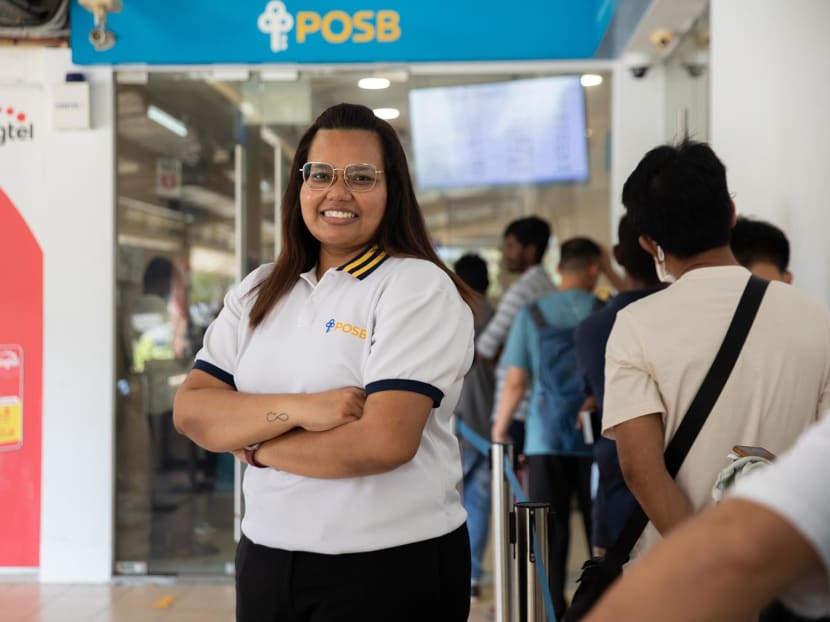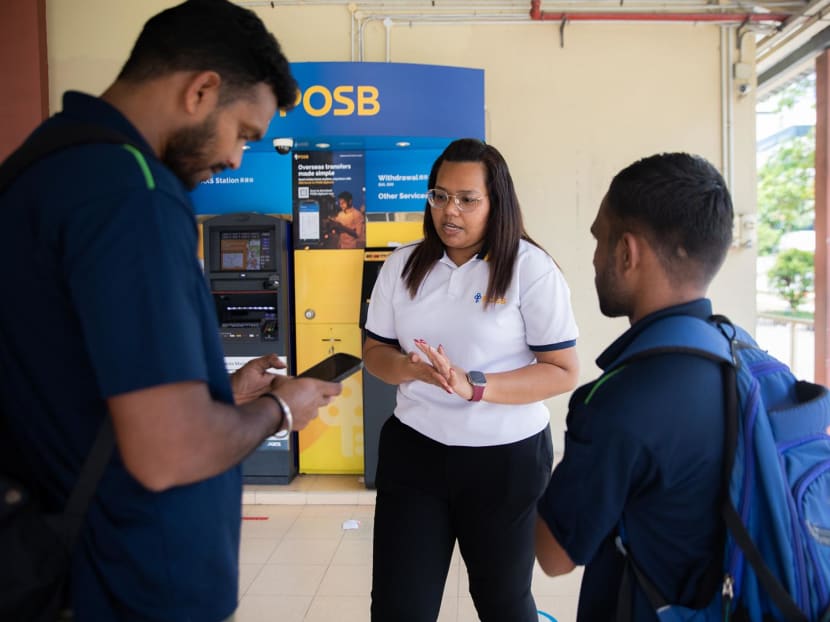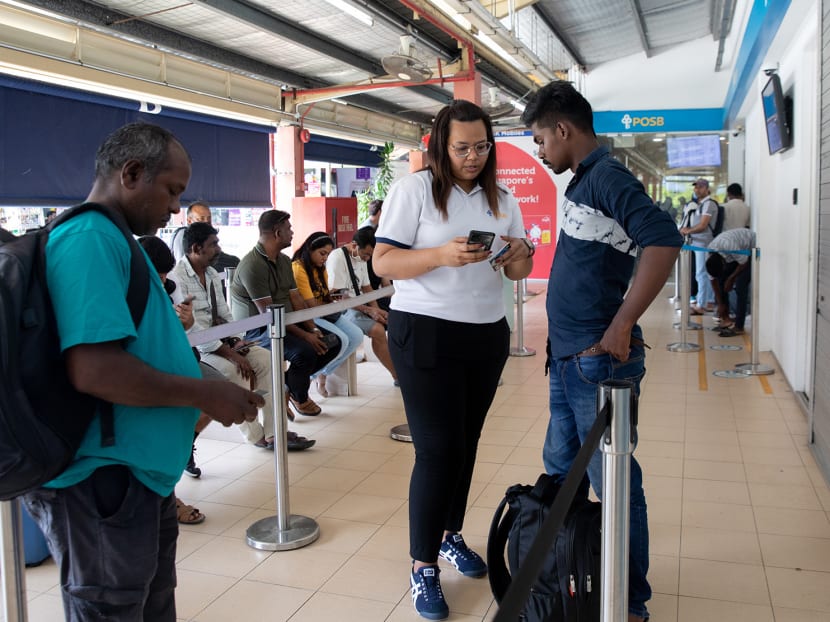Gen Y Speaks: Helping migrant workers as part of my bank job has opened my eyes to the needs of the vulnerable
Whenever someone asks me what I do in a bank, they’re surprised when I tell them I work with migrant workers.

Gen Y speaks writer Rishma Theru, 28, poses for a photo at the POSB Work Permit Account Service Centre on March 27, 2024. She is a business manager for the Work Permit segment at DBS Bank's Consumer Banking Group where she works with migrant workers.

This audio is AI-generated.
Whenever someone asks me what I do in a bank, they’re surprised when I tell them I work with migrant workers.
As a university graduate with a Bachelor’s degree in business studies and finance, most people expect me to be in corporate or private banking, rubbing shoulders with high-net-worth individuals and the like.
My current department handles the work permit segment. When I first joined four years ago, I was concerned about the fluency of my spoken Tamil — but to be honest, I wasn’t too sure about the prospect of working with migrant workers.
Like many of my friends and relatives, I harboured a jaundiced view of migrant workers at the time, a perception that was probably unhelpfully shaped by the Little India riots in 2013.
My parents were concerned as well, but nevertheless I decided to take a leap of faith and try it out. I told myself that there was a job to be done, and I would just go into this with an open mind.
Within the first few months of taking on my new role, my misconceptions slowly melted away. As I helped migrant and domestic workers with their account opening and banking enquiries, I found them shy, polite and appreciative of the help rendered to them.
Even so, it was still a job to me then and nothing more. That was the case until 2020, when I completed one year in the role.
‘JUST A JOB’ NO MORE
I remember how I was put in touch with the wife of a migrant worker who had passed away from a workplace incident that fateful year.
She had contacted her husband’s employer to seek help for the money in his POSB account to be transferred back to India.
That was the very first time my department and I had to assist with a request from a deceased worker’s next-of-kin.
Frankly, I was worried: What if I made a mistake that could hinder the speedy resolution of the request? I was also sad that a man’s life had ended — what if I couldn’t keep my emotions in check when speaking with his wife?
She lived in a small village in Coimbatore, a city in Tamil Nadu, India, and I had to do multiple calls with her to get the required information and documents mailed to Singapore in order to process the remittance request.
It was a laborious process as we had to liaise with many different parties. I also had to keep my emotions in check whenever I spoke with the widow.
I knew I could not do much to assuage her grief, but I resolved to do what was within my means to the best of my ability.
So, I expedited the paperwork for the worker’s hard-earned savings to be remitted to his family in India, who urgently needed the money to get by.
It took a lot of work, but the wife received the funds within a month. As she expressed her relief and gratitude, it struck me then that my job wasn’t “just a job”. It meant so much more to the people on the receiving end of my assistance.
From that point on, I began to see my role in a new light.

DOING MORE FOR MIGRANT AND DOMESTIC WORKERS
My team and I also partner with government agencies and non-government organisations to conduct workshops under the POSB’s Work Permit Holders Digital Literacy programme for migrant and domestic workers.
An important aspect of our workshops is teaching these vulnerable groups to identify scam calls and messages such as emails. Foreign domestic workers risk falling prey to scammers with fake job offers promising fast cash, while migrant workers are especially susceptible to scammers posing as government officials.
We typically run two workshops a month for up to 200 migrant workers at a time. For domestic workers, because of their rest days, we run workshops on alternate months for between 60 and 80 attendees.
One of the main challenges faced by migrant workers is the language barrier, as many of them have limited proficiency in English. This makes it difficult for them to interpret messages effectively, leading to misunderstandings and potential exploitation.
Working in a new environment further compounds the risks. As they are unfamiliar with local law processes, this group could be easily cowed into giving away their banking credentials when faced with intimidation or threats by “government officials”.
Amid the rising prevalence of scams, I wanted to do more to extend and expand our digital literacy outreach to migrant workers.
In 2023, I initiated a “train-the-trainer programme” where I would educate a few “big brothers” and “big sisters” as digital literacy ambassadors, so that they could go out and share their knowledge with fellow workers and friends.
Since the programme’s start, I have personally trained 40 ambassadors.

HARD WORK, HEART WORK
As I continue to become more invested in what I do, I found that my work is not just a job, but also about fulfilling a desire to help the vulnerable.
Because migrant and domestic workers work long hours and are often unable to visit bank branches during office hours, I would head out to condominiums, hospitals, and construction sites after office hours and even on weekends, just so I could reach out to these groups. I assist them with their banking queries and difficulties, and listen to them sharing their personal problems.
Making sure that my phone is switched on around the clock, I often get WhatsApp messages late at night seeking advice on a myriad of issues.
I’ve spent the past three Deepavalis at dormitories celebrating the festive occasion with migrant workers, as well as conducting digital literacy sessions on a public holiday.
At the beginning, I would tell myself to draw a clearer distinction between work and my personal life, but the more people I met and the more I came to understand their concerns and issues, the more I found myself motivated to help them in whatever little way I could.
I’ve also found friends: Last year, I invited Krishna — a migrant worker from India and one of the ambassadors I trained — to my house for dinner with my family.
It can be lonely being away from your loved ones on a major festive occasion such as Deepavali. It warmed my heart when Krishna thanked me for opening my house to him and allowing him to feel a sense of family on this special day.
In a world where self-advancement often takes centre stage, it's easy to turn a blind eye to the struggles faced by others, especially those sidelined to the margins of mainstream society.
I’ve learnt that it’s important for Singapore to continue amplifying the voices of migrant and domestic workers by providing platforms for them to share their stories and perspectives, and to advocate for themselves, whether through art, media, or community forums.
We must also continue to create more inclusive environments that are welcoming and supportive of the vulnerable groups who have travelled far from their homelands and communities to build our houses and roads and look after our parents and children.
The past four years have taught me that life is about so much more than chasing the pot of gold at the end of the rainbow. In an increasingly digitalised world with widening social and economic inequality, I believe that everyone can give a little of themselves to bring about positive change.
In the grand scheme of things, my efforts may be just a ripple — but even the smallest of ripples can become a big wave of change.
ABOUT THE AUTHOR:
Rishma Theru, 28, is a business manager for the Work Permit segment at DBS Bank’s consumer banking group.








